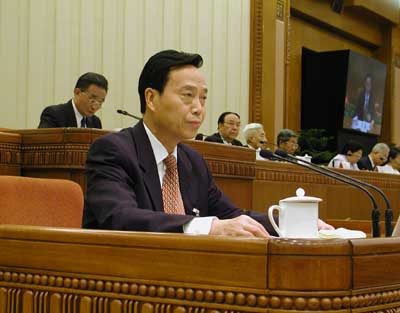| Tools: Save | Print | " target="_blank" class="style1">E-mail | Most Read |
| Draft Law Backs Right to Property |
| Adjust font size: |
|
Private property will be accorded the same protection as public property such as state-owned assets, according to a draft law. The fifth version of the draft law on property rights was submitted to the National People's Congress (NPC) Standing Committee yesterday for deliberation today. The draft law defines and governs matters relating to owners' rights of immovable and movable property. Giving equal protection to properties owned by different entities is vital for competition in the market economy, Hu Kangsheng, vice-chairman of the NPC Law Committee, said in his report on the revision of the draft law at an NPC Standing Committee conference. The latest version, whose deliberation has taken longer than originally expected, offers the equal-rights solution to the issue that provoked heated debate among national lawmakers in previous rounds of deliberation. During previous debates, there was a strong view among some sections of the NPC and the public that state-owned property be given precedence over private property. Differences over some issues which concern almost everyone in the country have caused the delay in the legislative plan, Yang Jingyu, director of the NPC Law Committee, told China Daily earlier this year. "We have solicited more than 11,500 opinions," Yang said then, adding that the draft law would be tabled at next year's annual session of the NPC after a review by the Standing Committee this month and December. At the full session of the NPC Standing Committee yesterday, two other legal documents the draft amendment to the Law on the Protection of Minors and the draft of the first ever bill on drug control were also submitted to the legislators. In the draft amendment to the Law on the Protection of Minors, effective since 1992, a ban is proposed on the sale of cigarettes and alcohol to people below the age of 18, who number around 300 million. It would compel shopkeepers to display signs saying that cigarettes and alcohol would not be sold to minors, although the penalty for a breach of the proposed clause is still to be specified. In the draft law on drug control, opium, heroin, marijuana, "ice" methamphetamine hydrochloride morphine, and cocaine are officially spelt out as substances to be banned in China. In practice, the country has been making a sustained effort in its war on drug abuse and trafficking within the country and across borders. Also submitted to lawmakers for review and debate will be draft laws on supervision, enterprise bankruptcy, anti-money laundering, and farmers' business associations, and the draft amendment to the existing law of business partnerships. The Proposal on the Sino-Pakistan Co-operative Agreement on Combating Terrorism, Separatism and Extremism was also submitted yesterday for deliberation and approval. The agreement, which was signed by China and Pakistan last year during Foreign Minister Li Zhaoxing's visit to Islamabad, defines terrorism, separatism and extremism, and outlines the scope of cooperation between the two countries.
(China Daily August 23, 2006) |
| Tools: Save | Print | " target="_blank" class="style1">E-mail | Most Read |
 |
| Related Stories |
|

